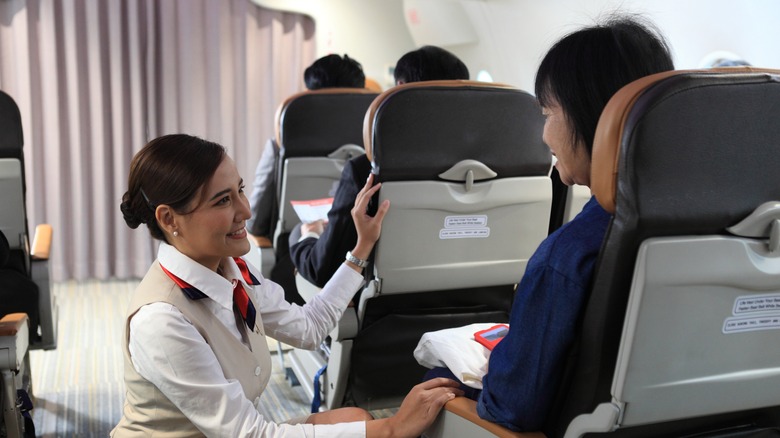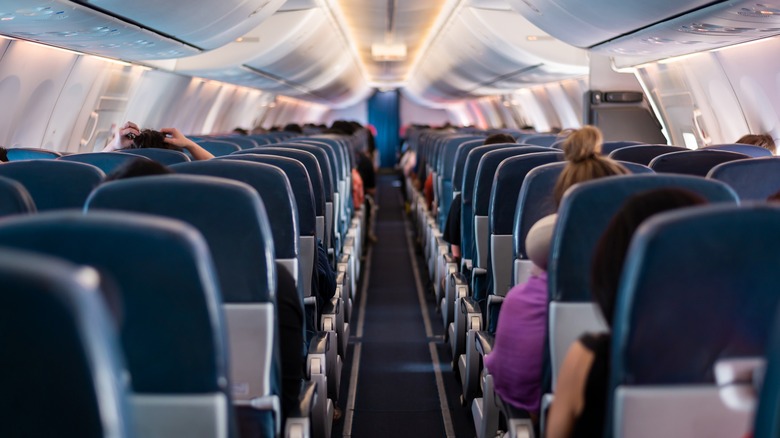Why Flight Attendants Have Received Much More Of This Specific Training Type Recently
Have you ever wondered what flight attendant training looks like? It involves an intensive five-to-seven-week course with diverse activities such as first aid, firefighting, and survival training. To pass the exams, trainees usually must score a minimum of 95%. Each year, cabin crew must undergo refresher training in emergency procedures, safety, and first aid. As passengers, we can feel confident in the highly trained flight attendants who might literally save our lives onboard an aircraft.
In recent years, conflict de-escalation training has played a more significant role, according to one flight attendant who wrote for Business Insider. As unruly passengers become more common, airlines are having to make plans to handle them.
Are disruptive passengers really that common? Sadly, they are. In 2023, 2,455 cases of unruly passenger behavior were reported to the Federal Aviation Administration (FAA). In comparison, in 2019 (before the pandemic upended air travel), there were only 1,161 reports. Bad behavior includes failing to follow the instructions of the cabin crew or being disruptive or violent onboard an aircraft. It's no wonder flight attendant morale is at an all-time low.
Passengers behaving badly
Most of us would never dream of raising our voices to cabin crew, let alone our fists. But we know you're curious, so let's look at some incidents that make de-escalation training essential. According to the International Air Transport Association, the most common incident types in 2022 were non-compliance, being verbally abusive, and being drunk. The report states that physical abuse remains rare, though it is increasing along with other kinds of unruly behavior.
Physical incidents often capture the headlines. In 2022, a man was charged by federal authorities after allegedly punching a flight attendant in the back of the head on an American Airlines flight from San José del Cabo to LAX. In an incident in 2024, a flight from Tokyo to Seattle returned to Tokyo after a passenger allegedly bit a member of the cabin crew. And in a case of verbal and physical abuse, two passengers forced an American Airlines flight to divert after using racist slurs and spitting at another passenger in 2021.
What's causing all of this? There are myriad reasons, from increased stress due to crowded planes or delays to passengers under the influence of alcohol or drugs. Many experts also think that people have become more entitled and less able to tolerate stress after the COVID-19 pandemic. Things got so bad during that time that the FAA introduced a zero-tolerance policy against unruly passengers, which has been extended into our post-pandemic era.
Talking us down
To counter the rise in unruly passenger behavior, airlines are focusing more and more on providing de-escalation training. Major carriers like American Airlines, United, and Delta have made this an integral part of their programs for cabin crew. What does this look like? In training, flight attendants run through potential scenarios with disruptive passengers and learn how to respond calmly and in an empathetic way. When situations get out of control, cabin crew are often encouraged to walk away and ask another crew member to help or take over.
Unfortunately, talking doesn't always work, and airlines have also had to step up their self-defense training for flight attendants. The Transportation Security Administration (TSA) has offered a free four-hour Crew Member Self Defense Program since 2004. Enrollment in this program has increased steadily since then and reached an all-time high in 2023. Self-defense tactics are a last resort for cabin crew, but they increasingly feel the need to have these skills in their toolkit, alongside de-escalation techniques.


